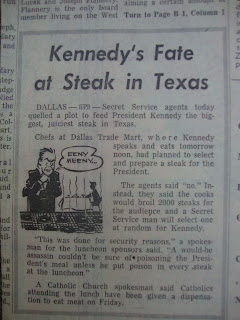 The premise… Maine schoolteacher Jake Epping has a chance to go back in time to track down Lee Harvey Oswald and interfere with the JFK assassination. He takes the plunge.
The premise… Maine schoolteacher Jake Epping has a chance to go back in time to track down Lee Harvey Oswald and interfere with the JFK assassination. He takes the plunge.The first section of 11/22/63 is setup. A friend introduces Jake Epping to the wormhole in time, and explains its machinations. No matter how long you stay it is always only two minutes later when you get back to the present, and it always brings you back to 1958. Once back in the past, Epping needs and identity and assumes that of George Amberson of Wisconsin. If the reader takes the bait and accepts the premise, King has a lazy cantering style that clip clops along in a breezy, unhurried pace as he re-creates America in 1958 and following. If you’re a reader like me who wants to cut to the chase and bypass mountains of detail, you may get impatient. On the other hand you may give in and go for the ride. Remember, we’re starting in 1958 and the destination is five years down the road. As expected, King throws in more twists and turns than a sidewinder.
This book blends two themes which are endlessly fascinating for most Americans: the JFK assassination and time travel. H.G. Wells started it, Robert Zemeckis popularized it again in the 1980’s with his Back to the Future trilogy, and many other films such as Peggy Sue Got Married toy with it. What happens when we enter the past and tamper with it? It’s a variation on the butterfly effect. Choices have ramifications. Will history have alternate outcomes if we go back in time and mess with it?
(I toyed with a variation on this theme in one of my own stories, Unremembered History of the World, which you can read in my short story collection Unremembered Histories.)
 Currently I am half way through the book, 500 pages to go. Throughout we get memory jogs of what life was like a half century ago, sewn seamlessly into the story. Here’s one of a thousand examples. “I never saw a single fast food franchise, unless you count Howard Johnson’s with its 28 Flavors…” How long has it been since I thought about Howard Johnson’s? And can you imagine a road trip without running into golden arches?
Currently I am half way through the book, 500 pages to go. Throughout we get memory jogs of what life was like a half century ago, sewn seamlessly into the story. Here’s one of a thousand examples. “I never saw a single fast food franchise, unless you count Howard Johnson’s with its 28 Flavors…” How long has it been since I thought about Howard Johnson’s? And can you imagine a road trip without running into golden arches?I like the first person approach in the story. It enables the reader to follow the narrator’s thinking as it evolves, as it wrestles with the conundrums of his experience. His quest is a noble one and you’re rooting for him as well. You learn with him as he goes along.
At this point (halfway through the book) his love relationship with Sadie has just fallen apart, a relationship that took hundreds of pages to get to. The sojourn down Lover’s Lane with Sadie helps King throw in details about attitudes towards sex during that time, as well as details about preventing pregnancy before the pill. The wedge that finally divides them is Epping/Amberson’s failure to remain completely in the 50’s, inadvertently singing Honky Tonk Woman while driving in his car with her, a realistic oops that would probably happen to any of us, singing a favorite song that had not yet been written. At this she points out another half dozen or more occurrences where he used expressions that just weren’t from that place in time, like kick out the jams, and dude.
In this sense, King has done a masterful job of being realistic even in this most unrealistic fictional premise. John Gardner once wrote, “Detail is the lifeblood of fiction,” and you can see here that King has done his homework, not only with the facts of the fifties, but the behavior of his characters.
I don’t have to know how it ends to give it a strong endorsement. It may become the longest book I’ve ever read. It’s certainly hard to put down… and is waiting for me now.
Photos... Top right: The target of Jake Epping/George Amberson's quest... to stop this man.
Middle: Article from Cleveland Plain Dealer, the day before it happened.
CLICK IMAGES TO ENLARGE
"...King has done his homework, not only with the facts of the fifties..."
ReplyDeleteReally? I have never seen so many errors in a Stephen King book, and most of them have to do with things that are wrong regarding his facts of the '50s. For example, twice he mentions the police cars as having flashing blue lights (which never occurred until the early '70s). Let me tell you, there are several more...
I must not have been as careful of a reader as I ought to have been. I am not a huge Stephen King reader but when I travelled back in time with his hero there were a lot of forgotten "Aha" memories evoked so I kind of failed to notice the other particulars.
ReplyDeleteHaving visited the grassy knoll for the first time is what initially provoked me to pick up such a long story, but I did enjoy some of the Memory Lane details.
Thanks for the gentle poke to be careful about blanket statements like that.
e.